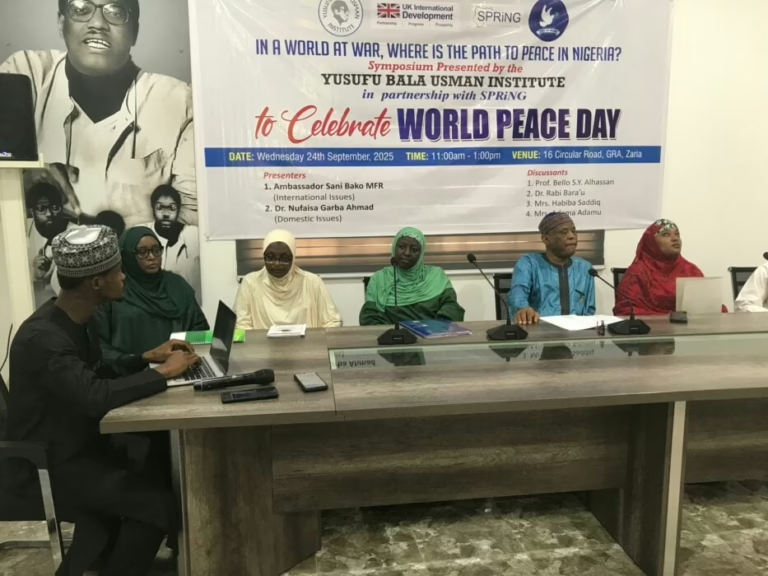Amid escalating international conflicts and ongoing internal unrest, the Yusufu Bala Usman Institute (YBUI) in Zaria hosted a nationwide conference to commemorate World Peace Day 2025, calling on Nigerians to unite in fostering a harmonious future.
Under the theme “In a World at War, Where is the Path to Peace in Nigeria?”, the gathering assembled diplomats, scholars, faith leaders, policy analysts, grassroots organisers, and young people to examine the nation’s peace obstacles and devise innovative solutions.
Organised in collaboration with SPRiNG, the symposium transcended mere observance, serving as a forum for candid discussions and strategic analysis of Nigeria’s conflict drivers-ranging from insurgency and armed banditry to political marginalisation and the spread of false information.
In his keynote speech, Ambassador Sani Bako, a seasoned diplomat and Director for Asia-Pacific affairs, underscored that sustainable development is unattainable without peace.
“Nigeria’s pursuit must extend beyond internal tranquility,” he asserted, “to becoming a beacon of dialogue, inclusivity, and justice on the global stage.”
Dr. Nufaisa Garba Ahmad, a peace scholar affiliated with the Nigerian Defence Academy, highlighted the imperative of confronting historical wounds and addressing neglect at the grassroots level.
“Peace is not something that can be forced; it grows through reconciliation, fairness, and education,” she remarked.
She further cautioned against the harmful impact of digital misinformation in exacerbating divisions and violence, urging citizens to exercise discernment and promote peaceful narratives online.
“Social media is rife with falsehoods, and incendiary language can lead to tangible harm,” she warned.
A panel discussion delved into peace from diverse angles including historical context, policy frameworks, gender roles, and generational viewpoints.
Professor Bello S.Y. Alhassan emphasized the role of history education in national recovery. Dr. Rabiu Bara’u advocated for governance that embraces all voices, stating, “Conflict flourishes where injustice is allowed.”
Mrs. Habiba Saddiq called for enhanced acknowledgment of women’s contributions to peace efforts, while Mrs. Adama Adamu encouraged harnessing the dynamism of Nigerian youth towards leadership and creative solutions.
Participants, including students and local peace activists, resonated with the appeals for justice, inclusivity, and empowerment.
Concluding the event, a YBUI representative reminded attendees that peacebuilding extends beyond governmental duties. “Peace starts with each of us-in our families, neighborhoods, schools, and places of worship,” the message affirmed.
The symposium closed with attendees pledging to act as peace ambassadors within their communities, reinforcing the conviction that enduring stability is achievable only through united efforts, honest dialogue, and ongoing engagement.

















